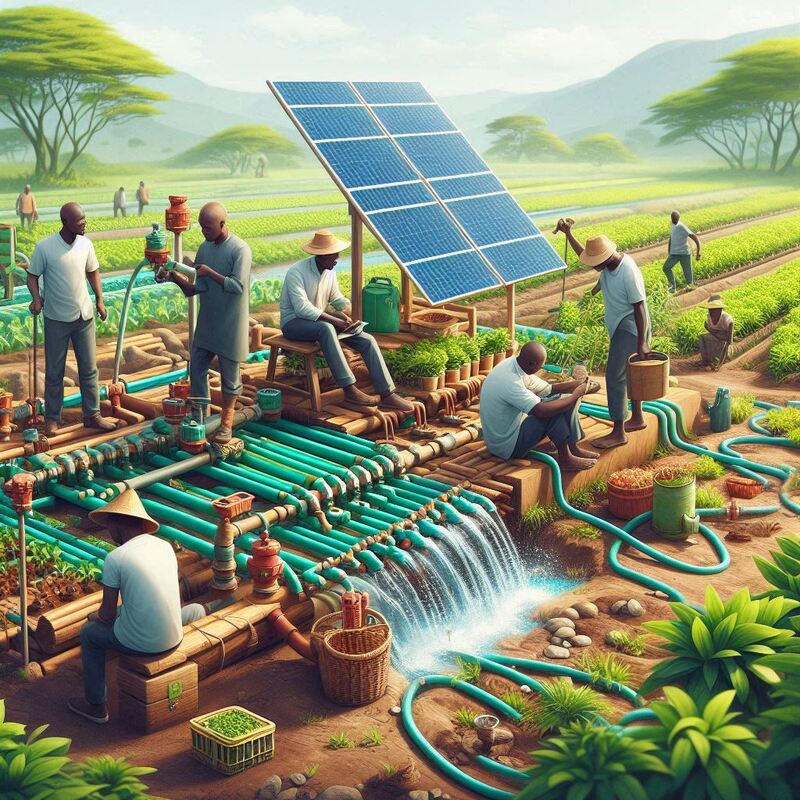
Efficient water management is crucial for the sustainability and profitability of any farm, especially in regions like Nigeria and the rest of Africa where water resources can be scarce. Optimizing water usage not only conserves this vital resource but also enhances crop yields and reduces costs. Here’s a comprehensive Q&A guide to help you optimize your farm’s water usage.
Q1: Why is optimizing water usage important for my farm?
A: Optimizing water usage is essential for several reasons:
- Sustainability: It ensures that water resources are used efficiently and conserved for future generations.
- Cost Savings: Reducing water waste lowers your utility bills and operational costs.
- Improved Yields: Proper water management can lead to healthier crops and higher yields.
- Environmental Impact: Efficient water use reduces the risk of soil erosion, nutrient leaching, and water pollution.
Q2: What are the best practices for efficient irrigation?
A: Efficient irrigation practices include:
- Drip Irrigation: This method delivers water directly to the root zone of plants, minimizing evaporation and runoff.
- Sprinkler Systems: These systems can be efficient if properly managed, ensuring even water distribution.
- Scheduling: Watering crops during cooler parts of the day (early morning or late evening) reduces evaporation.
- Soil Moisture Monitoring: Use sensors to monitor soil moisture levels and irrigate only when necessary.
Q3: How can I implement rainwater harvesting on my farm?
A: Rainwater harvesting involves collecting and storing rainwater for agricultural use. Here’s how you can implement it:
- Install Gutters and Downspouts: Collect rainwater from rooftops and direct it to storage tanks.
- Storage Tanks: Use large tanks or reservoirs to store the harvested rainwater.
- Filtration: Ensure the water is filtered to remove debris and contaminants before use.
- Distribution: Set up a distribution system to irrigate your crops with the stored rainwater.
Q4: What role does soil health play in water optimization?
A: Healthy soil is crucial for effective water management:
- Soil Structure: Well-structured soil with good organic matter content retains water better and reduces runoff.
- Cover Crops: Planting cover crops helps improve soil structure, reduce erosion, and increase water infiltration.
- Mulching: Applying mulch to the soil surface helps retain moisture, reduce evaporation, and suppress weeds.
Q5: How can technology aid in optimizing water usage?
A: Technology can significantly enhance water management on your farm:
- Smart Irrigation Controllers: These devices adjust irrigation schedules based on weather conditions, soil moisture, and plant needs.
- Drones: Drones equipped with sensors can monitor crop health and soil moisture levels, providing valuable data for irrigation management.
- Mobile Apps: There are various mobile apps available that offer real-time weather updates, irrigation scheduling, and soil moisture monitoring.
Q6: What are some traditional methods of water conservation that can still be effective today?
A: Traditional methods can be highly effective in conserving water:
- Terracing: Building terraces on slopes reduces runoff and increases water infiltration.
- Contour Farming: Planting along the natural contours of the land helps slow water runoff and promotes water absorption.
- Bunding: Creating small earthen barriers around fields helps retain water and reduce soil erosion.
Q7: How can I ensure that my water optimization practices are sustainable in the long term?
A: Ensuring long-term sustainability involves:
- Regular Monitoring: Continuously monitor water usage and soil moisture levels to make necessary adjustments.
- Community Engagement: Work with local communities and stakeholders to share knowledge and resources for water conservation.
- Education and Training: Stay informed about new technologies and practices in water management and provide training for farm workers.
Conclusion
Optimizing your farm’s water usage is not only about conserving a precious resource but also about enhancing the efficiency and productivity of your agricultural practices. By adopting modern irrigation techniques, implementing rainwater harvesting, maintaining soil health, leveraging technology, and utilizing traditional methods, you can achieve sustainable water management.
This comprehensive Q&A guide provides actionable insights and strategies for optimizing water usage on your farm. Implement these practices to ensure a more sustainable and profitable farming operation. Share this valuable information with fellow farmers and agripreneurs across Nigeria and Africa to promote water conservation and sustainable agriculture.


